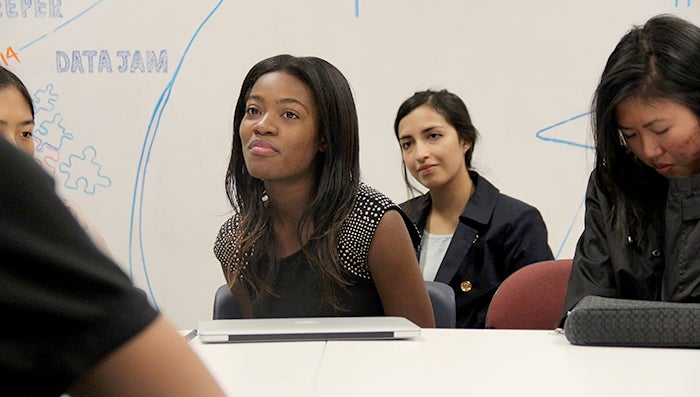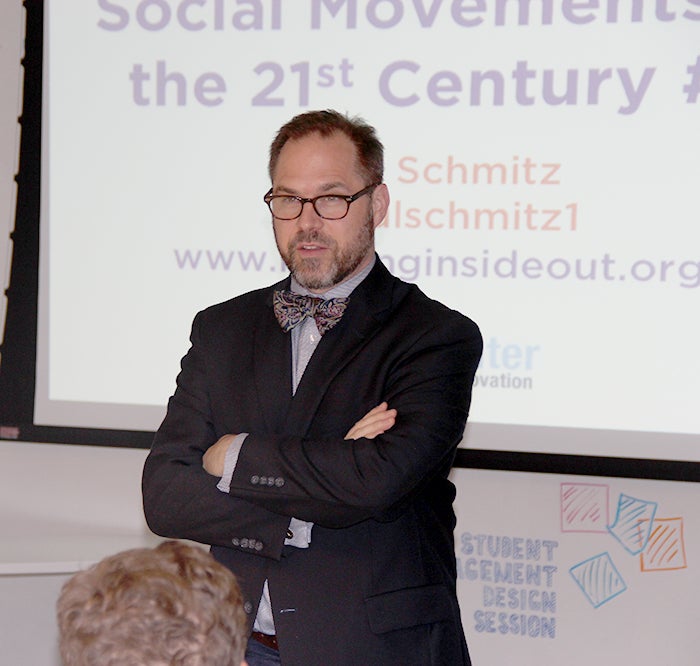Title: Student Social Change Advocates Learn Strategy in Seminars
Students learn how effective social movements develop and make an impact during a four-part seminar offered by Georgetown’s Beeck Center for Social Impact and Innovation.

Gaelle Pierre-Louis (SFS’17) says she came to Georgetown to learn how to create social change in communities, something she and a few dozen other students are learning in a four-part seminar at the university’s Beeck Center for Social Impact and Innovation.
So far, she’s learned that a lot of structure is required for effective social movements.
“Some of the most interesting things that I have taken away from this course include the history of social movements – such as Black Lives Matter, the difference between top-down and bottom up leadership styles and the influence of social movements on political campaigns of the 21st century,” says Pierre-Louis, a culture and politics major from Williamstown, New Jersey.
Protecting the Vulnerable
Pierre-Louis has participated in three sessions of the Social Movements in the 21st Century seminars offered by the Beeck Center this semester and plans to participate in the final session on Dec. 1.
Beeck Center executive director Sonal Shah says the seminar shows how the digital and social revolutions connect in the United States and across the globe.
“We’re looking at how technology has played a pivotal role in increasing citizen engagement through greater inclusion and active participation in the policy decisions shaping our society,” Shah says. “We see this course as a direct reflection of the university’s Jesuit values, as each movement focuses on the struggle to protect and advance our most vulnerable and marginalized communities.”
Strategy Equals Success

Paul Schmitz, Beeck Center innovator-in-residence, says long-term strategy makes social movements successful.
National social sector leader Paul Schmitz is teaching the seminars, which explore the development of social movements such as the civil rights movement of the 1950s and 1960s, Occupy Wall Street, Black Lives Matter and the Tea Party.
“What we have learned over the years is that long-term strategy makes social movements successful,” says Schmitz, a Beeck Center innovator-in-residence.
Though technological advances have played a significant role in social movements, he says that doesn’t cancel out the importance of having a good plan and structure in place to galvanize participants in the movement.
“You have to look at how these technological advances affect the goals, methods and effectiveness of social and political movements,” Schmitz says. “Technology is the accelerator, not a strategy.”
He said one of the Occupy Wall Street founders that described how “the protest looked better on Facebook than it did on the streets.”
Single-Leadership Myth
Schmitz also deconstructed the civil rights movement by killing the myth of the single-leader movement.
Rev. Martin Luther King Jr. and a few others may have been the faces of the civil rights movement, but there were multiple leaders who made significant contributions, including Bayard Rustin, Ella Baker, Medgar Evers and countless others.
“Growing up, the history books seemed to suggest that Rosa Parks and Martin Luther King, Jr. were accidental leaders,” Pierre-Louis says. “But in fact, their roles and positions in the movement were strategic and well thought out with long-term planning.”
Effective Engagement
Angela Wong (C’19) of New York says she attended the Oct. 20 and Nov. 3 seminar sessions out of general curiosity and her interest in human rights issues. She was surprised to find out the time frame in which the Tea Party movement developed.
“Before taking this course, I had assumed that it had started long before it did,” she says referring to the conservative grassroots movement established in 2004. “It’s amazing that they’ve already become so prominent in America’s political landscape.”
Wong and Pierre-Louis both hope to one day apply what they’ve learned from the seminar, whether that’s in the United States or elsewhere.
“I found that successful social movements and their leaders do not emerge overnight, and it takes a team of people working on the frontlines and behind the scenes to make change happen,,” Pierre-Louis says. “This seminar has shaped the way I think about movements and how to effectively engage in them in the future.”